|
|
|
Sort Order |
|
|
|
Items / Page
|
|
|
|
|
|
|
| Srl | Item |
| 1 |
ID:
159963
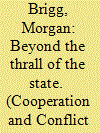

|
|
|
|
|
| Summary/Abstract |
Although the idea of the state pervades the scholarship and practice of international interventions, developing adequate knowledge of intervention contexts such as Solomon Islands requires decentring dominant perceptions about possible sources of socio-political order. In response, this article demonstrates the value of ‘relationality’ and ‘affect’ for analysing the diverse ways in which governance arises as an effect of social practice, without assuming that the state is unimportant or romanticizing statelessness. Giving conceptual priority to relations over entities while considering hitherto neglected affective forms of human interaction enables the identification of diverse micro-political forms of socio-political order and peace governance effects. An autoethnographic examination of relational-affective peace governance in post-conflict Solomon Islands shows that circulations of affect, feeling and emotion attach more strongly to customary and church institutions than they do to the state or to international interveners. This demonstrates the need to engage with unexpected sources of governance while the requirement to analyse findings within a broader historical frame signals the need to also engage with the state. A relational-affective approach, which has the potential for wider application, thus provides a way of analysing and engaging with diverse forms of political order in international interventions beyond the predilections of Northern scholarship.
|
|
|
|
|
|
|
|
|
|
|
|
|
|
|
|
| 2 |
ID:
159965
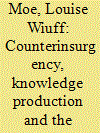

|
|
|
|
|
| Summary/Abstract |
Counterinsurgency witnessed a powerful revival in our post-9/11 world. With its focus on the control of territory, populations and seemingly less kinetic hearts and minds campaigns—as well as a good dose of liberal humanitarianism—contemporary counterinsurgency has become the dominant form of the Western military interventionism. While most of the associated debates focus on the potentials and pitfalls of Western counterinsurgency approaches, the role of South-South cooperation in the making of ‘Global Counterinsurgency’, and the related emerging geopolitical convergences of interest between Western and non-Western elites in counterinsurgency, has received little attention. In focusing on counterinsurgency-related forms of knowledge production, and by analyzing the role of transnational military knowledge entrepreneurs promoting a form of coercive Realpolitik that supports ‘locally owned’ elite-driven counterinsurgency efforts in the field of South-South military cooperation between Colombia and Somalia, this article addresses this void. We show that conventional North/South divides no longer capture the realities of counterinsurgent warfare going global and call for a de-centering of the study of military interventions that is sensitive to how knowledge production in regards to ‘Global South’ contexts not only makes them legible, and thereby more governable, but also how this knowledge production informs ongoing reconfiguration of interventions themselves.
|
|
|
|
|
|
|
|
|
|
|
|
|
|
|
|
| 3 |
ID:
159968
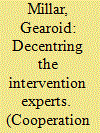

|
|
|
|
|
| Summary/Abstract |
The failures of peace interventions are often associated with their exogenously conceived and technocratic nature, which discount complexity within and diversity between post-conflict contexts. In response, scholars have resorted to concepts of empowerment, resistance, hybridity and friction to refocus post-conflict policymaking away from ‘top-down’ and towards ‘bottom-up’ processes. Any such efforts, however, require that policymakers understand the local drivers and everyday experiences of peace interventions across a range of cases, a task for which the current tools of the intervention experts have proven unsuited. This article, therefore, proposes an Ethnographic Peace Research (EPR) agenda that would provide access for and influence to the ‘peace kept’ and decentre the intervention experts in peacebuilding policy. In its effort to influence policy, however, an EPR agenda faces substantial challenges. These include, among others, the failure of academics to communicate clearly to non-academic audiences, the ideological biases of policymakers and the relentless simplification of complexity. However, as will be discussed and evidenced using a variety of cases below, an EPR approach also has a number of strengths that can enhance its relevance for policy, serve to decentre the intervention experts and develop a credible alternative bottom-up approach to policymaking in post-conflict states.
|
|
|
|
|
|
|
|
|
|
|
|
|
|
|
|
| 4 |
ID:
159964


|
|
|
|
|
| Summary/Abstract |
This article examines the perceptions of domestic actors in international governance and state-building interventions. To further decentre a research field that has so far focused primarily on the perceptions and representations of actors in the Global North, the article reconstructs how a specific set of domestic actors sees the presence of donors in international interventions and their own interactions with them. Drawing on recent advances in relational sociology, our analysis focuses on how domestic intermediary actors in two post-war political settings exposed to external state-building interventions conceive of and navigate their social relations with the interveners. We find that they frequently view interveners as mainly interest-oriented, bureaucratic and erratic actors. In contrast to studies that posit a clear-cut and static hierarchy between Northern interveners and Southern targets of interventions, the article moreover paints a more nuanced picture of the interactions and relations between interveners and ‘the intervened upon’. The article illustrates its argument by drawing on a series of problem-centred and expert interviews in Côte d’Ivoire and Lebanon.
|
|
|
|
|
|
|
|
|
|
|
|
|
|
|
|
| 5 |
ID:
159966


|
|
|
|
|
| Summary/Abstract |
Hybridisation is often conceptualised as a ‘liminal’ occurrence, a ‘contact point’ or the product of an ‘interface’. This tends to invoke the very binaries that the concept seeks to overcome, because it assumes that a meeting between separate entities must occur for hybrid orders to emerge. Instead, this article argues that processes of hybridisation and how they assemble disparate types of authority lie at the very core of how social processes evolve. The argument is substantiated empirically by exploring the internal and external dynamics that have shaped and partly fragmented the security sector of Puntland, the largest and most stable region in Somalia (beyond Somaliland). The analysis centres on attempts by the United Nations (UN) to support the Puntland government in reducing numbers of the region’s constitutionally recognised security forces. In this analysis, the article shows how the Puntland government necessarily has to balance and negotiate conflicting demands of clan leaders, the global and regional security interests of individual governments, notably the United Arab Emirates and the United States of America, as well as continued pressure from the ‘international community’, formally represented by the UN, to act as a functioning regional centre within a federal Somalia.
|
|
|
|
|
|
|
|
|
|
|
|
|
|
|
|
| 6 |
ID:
159962
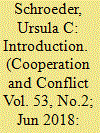

|
|
|
|
|
| Summary/Abstract |
International interventions are an omnipresent and increasingly diverse instrument in world politics. This special issue of Cooperation and Conflict follows broader calls to ‘decentre’ the study of International Relations and seeks to contribute to a research agenda that goes beyond the prevailing focus on Northern actors and interests in interventions research. The special issue advances two interrelated research strategies to decentre the study of international interventions. First, it promotes research that gives voice to the diversity of experiences and perspectives outside the Northern centre. Second, it embraces an emerging set of methodological advances that draw on sociological and ethnographic research traditions in order to advance the in-depth study of interventions. With contributing authors from the fields of peace and conflict studies, regional and area studies, as well as International Relations, the special issue sets out to build bridges across disciplinary boundaries by bringing together a set of experts who normally speak to separate audiences within their respective research fields. Taking research beyond the ‘classical’ cases of intervention, the articles provide in-depth case narratives of intervention practices in the Solomon Islands, Colombia, Somalia, Puntland, Côte d’Ivoire, Lebanon and Jordan.
|
|
|
|
|
|
|
|
|
|
|
|
|
|
|
|
| 7 |
ID:
159967
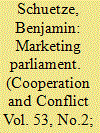

|
|
|
|
|
| Summary/Abstract |
The Jordanian parliament is widely recognised as a patronage provider and means for authoritarian upgrading. Despite, or precisely because of this, it has over the past years become a linchpin of US and European attempts at parliamentary strengthening. The parliament’s highly marginalised position notwithstanding, this article suggests that such efforts provide us with an insightful opportunity to better understand the reconfiguration of authoritarian power via external intervention in the name of democracy. Discussing the contradictory effects of parliamentary strengthening programmes in Jordan, the article tries to shift the discussion of democracy promotion away from a concern with policy, conceptual debates and intentions to one with democracy promotion’s constitutive effects. As such, the article investigates the framing of Jordanian politics within a market rationale as central mechanism for the de-politicisation of uneven power relations. Further, it explores the ways in which democracy promotion serves to seemingly reconfirm interveners’ desired self-understandings via the maintenance of assumptions of cultural ‘difference’. Ultimately, it is suggested that decentring the study of democracy promotion by paying more attention to its constitutive effects provides us with a better understanding of why and how increasing democracy promotion portfolios have, in Jordan, had the effect of strengthening authoritarianism.
|
|
|
|
|
|
|
|
|
|
|
|
|
|
|
|
| 8 |
ID:
159969


|
|
|
|
|
| Summary/Abstract |
Eurocentrism in the analysis of European foreign policy often renders scholars blind to other world views and realities, although engaging with these may be critical for understanding the relevance and impact of this policy in other parts of the world. Notwithstanding calls for decentring the study of International Relations and European foreign policy in particular, scholars of European foreign policy generally lack the tools and conceptual lenses to overcome Eurocentrism in their analyses. This article proposes an analytical framework to systematically open up for difference, and to see and understand dynamics and realities that go beyond dominant Eurocentric accounts, while trying to avoid the pitfalls of simplification and knowledge fragmentation. The framework consists of six partially overlapping decentring categories – spatial, temporal, normative, polity, linguistic, and disciplinary decentring – and is developed through two dimensions of the Decentring Agenda proposed by Fisher Onar and Nicolaïdis: ‘provincialising’ (questioning Eurocentric perspectives) and ‘engagement’ (learning from other perspectives). In this way, this article aims to support scholars of European foreign policy in overcoming Eurocentrism and in operationalising the Decentring Agenda.
|
|
|
|
|
|
|
|
|
|
|
|
|
|
|
|
|
|
|
|
|